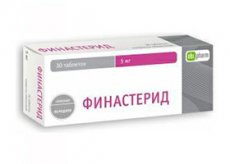Medical expert of the article
New publications
Preparations
Finasteride
Last reviewed: 04.07.2025

All iLive content is medically reviewed or fact checked to ensure as much factual accuracy as possible.
We have strict sourcing guidelines and only link to reputable media sites, academic research institutions and, whenever possible, medically peer reviewed studies. Note that the numbers in parentheses ([1], [2], etc.) are clickable links to these studies.
If you feel that any of our content is inaccurate, out-of-date, or otherwise questionable, please select it and press Ctrl + Enter.

Finasteride exhibits antiandrogenic medicinal activity. It is a hormonal medication – it is an artificial selective blocker of 5α-reductase type 2 activity.
The drug reduces tissue and free dihydrotestosterone levels with high efficiency. At the same time, the drug does not demonstrate tropism for androgenic endings, and at the same time does not have any other hormonal effect on the body.
 [ 1 ]
[ 1 ]
Indications Finasteride
It is used for the following disorders:
- benign prostatic hyperplasia (to reduce its size);
- when there is a need to improve the processes of urination, as well as to alleviate the symptoms of existing hyperplasia;
- the need to reduce the risk of developing acute urinary retention, which requires catheterization or surgery.
 [ 2 ]
[ 2 ]
Release form
The release of the medicinal element is realized in tablets - 7, 10 or 14 pieces inside a cellular pack. Inside the box there are 1, 2, 3 or 4 such packs.
Pharmacodynamics
The 5α-reductase component (type 2) is an intracellular enzyme that converts testosterone into the androgenic substance dihydrotestosterone, which exhibits higher therapeutic activity.
In the case of prostate adenoma, the increase in its size is directly determined by the conversion of testosterone into the element dihydrotestosterone inside the tissues of the prostate gland.
Pharmacokinetics
The drug is fully and rapidly absorbed in the intestine. The absorption process ends after approximately 7 hours. The average bioavailability is 80%. Cmax values in circulating blood are recorded after 1-2 hours.
93% of drug molecules bind to intraplasmic protein. The drug overcomes the BBB if used for 7-10 days. Intrahepatic metabolic processes lead to the formation of 5 metabolic elements, of which only two are active.
The half-life is approximately 6 hours. About 39% of the administered dose is excreted in the urine in the form of derivatives, and the remainder in the feces.
Side effects Finasteride
Main side effects:
- immune disorders: signs of hypersensitivity;
- mental disorders: decreased libido;
- problems with circulatory function: development of palpitations;
- lesions associated with digestive activity: activation of intrahepatic enzymes;
- epidermal disorders: itching, rash or urticaria;
- symptoms related to sexual function and mammary glands: gynecomastia, impotence, pain in the testicular area, ejaculation disorder and decreased volume of ejaculate.
 [ 12 ]
[ 12 ]
Overdose
Combination with Ca channel blockers, benzodiazepines, ACE inhibitors, NSAIDs, as well as with nitrates, H2-end blockers, β-blockers, diuretics, quinolones, HMG-CoA reductase inhibitors, as well as with α-blockers does not lead to the appearance of a noticeable therapeutic interaction.
Storage conditions
Finasteride should be stored in a place protected from sunlight, moisture and children.
Application for children
Finasteride is not used in pediatrics.
 [ 23 ]
[ 23 ]
Analogues
Analogues of the drug are Urofin, Penester, Finister and Finasteride Teva with Adenosteride-Health, as well as Proscar, Avodart, Urofin and Finpros with Prostan.
 [ 24 ], [ 25 ], [ 26 ], [ 27 ], [ 28 ]
[ 24 ], [ 25 ], [ 26 ], [ 27 ], [ 28 ]
Reviews
Finasteride receives good reviews from patients - with long-term use according to the doctor's chosen regimens, the drug demonstrates high therapeutic effectiveness.
Attention!
To simplify the perception of information, this instruction for use of the drug "Finasteride" translated and presented in a special form on the basis of the official instructions for medical use of the drug. Before use read the annotation that came directly to medicines.
Description provided for informational purposes and is not a guide to self-healing. The need for this drug, the purpose of the treatment regimen, methods and dose of the drug is determined solely by the attending physician. Self-medication is dangerous for your health.

